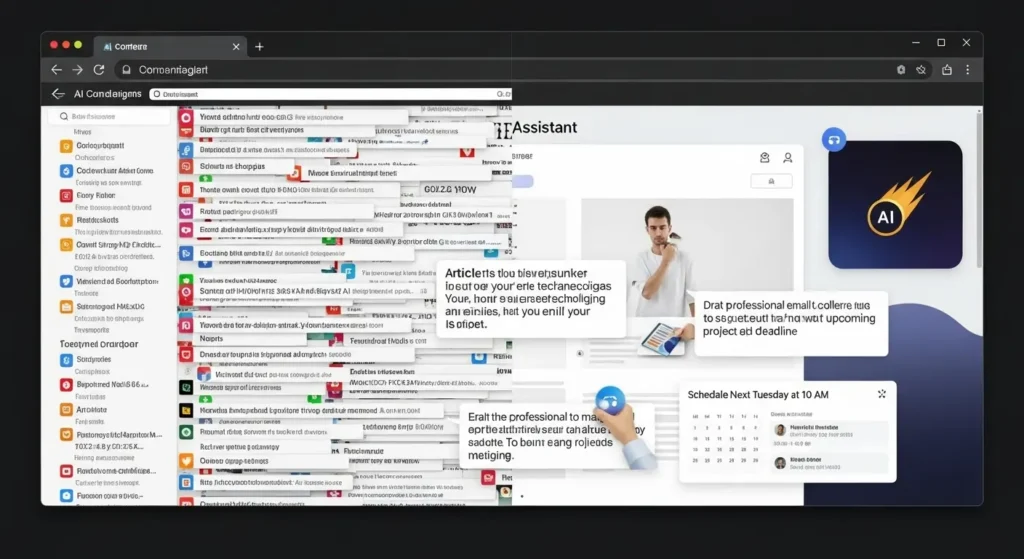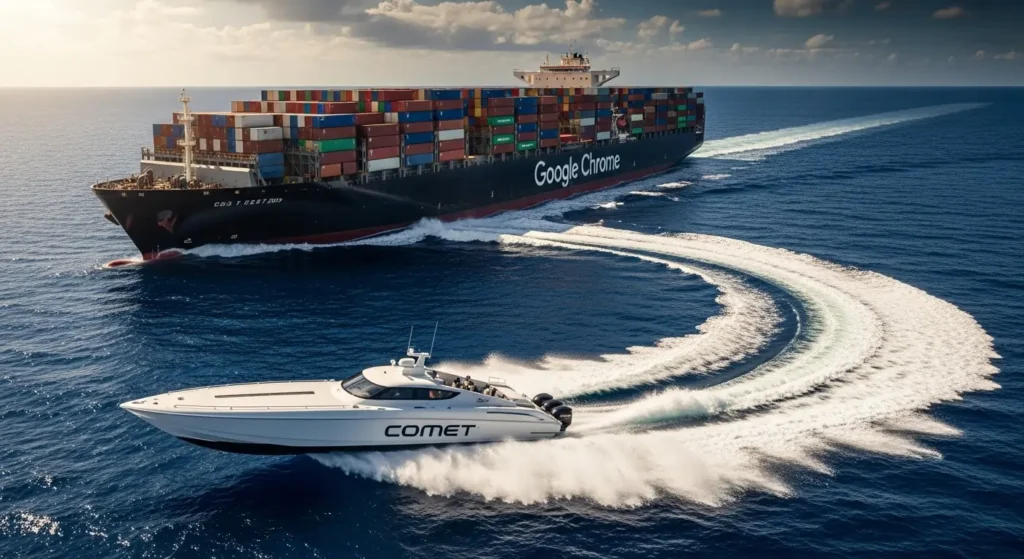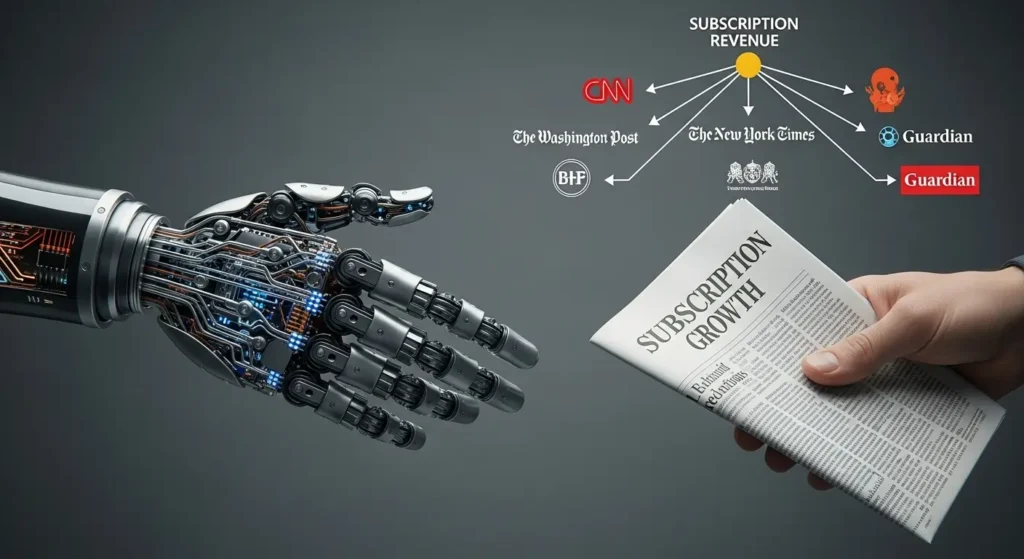Perplexity AI makes its revolutionary Comet browser free worldwide, challenging Google Chrome with agentic AI capabilities and personal assistant features.
Table of Contents
AI-Powered Browsing Enters the Mainstream
Perplexity AI has made a bold strategic move that could reshape the browser landscape: Perplexity’s Comet Browser Goes Global and Free.
The company announced on October 2, 2024, that its previously exclusive AI-powered browser is now available worldwide at no cost, removing both the $200 monthly subscription barrier and the millions-strong waitlist that had restricted access.
This marks a pivotal moment in the battle for the future of web browsing, as Perplexity positions its Comet browser as a direct challenger to Google Chrome’s dominance.
The move comes at a time when major tech companies are racing to integrate artificial intelligence into their browser offerings, with Google recently rolling out Gemini features in Chrome and OpenAI preparing its own browser launch.
Revolutionary Features That Set Comet Apart

Perplexity’s Comet Browser Goes Global and Free with capabilities that fundamentally transform how users interact with the web.
Unlike traditional browsers that simply display web pages, Comet functions as a personal AI assistant built on the Chromium framework, ensuring compatibility with existing Chrome extensions and bookmarks.
The browser’s standout feature is its Agentic AI capabilities, which allow users to accomplish complex tasks through natural language commands.
The Comet Assistant can summarize articles, draft emails, schedule meetings, compare products across websites, and even complete authorized transactions—all without switching between tabs or applications.
CEO Aravind Srinivas revealed compelling user behavior data: when users first download Comet, their question volume increases by 6-18 times on the first day, demonstrating the transformative power of seamless AI integration.
This dramatic increase in engagement suggests that Perplexity’s Comet Browser Goes Global and Free strategy could rapidly accelerate user adoption.
Advanced AI Integration Powers Productivity

The browser’s AI architecture represents a significant leap forward from traditional web browsing.
Comet integrates multiple large language models, including Perplexity’s proprietary models, GPT-4, Claude, and Gemini, creating a sophisticated AI ecosystem that can handle diverse tasks.
Key productivity features include:
- Workspace Organization: The browser introduces intelligent tab management and project workspaces that reduce clutter and maintain context across complex online activities
- Content Automation: Users can convert web pages into emails, generate summaries of lengthy documents, and automate price comparisons across multiple retailers
- Real-Time Analysis: The AI can analyze webpage content in real-time, providing contextual recommendations and insights without manual prompts
- Cross-Tab Intelligence: Unlike traditional browsers, Comet maintains awareness across all open tabs, enabling seamless information synthesis
Strategic Competition Against Browser Giants

With Perplexity’s Comet Browser Goes Global and Free, the company is directly challenging the browser ecosystem dominated by Google Chrome, which maintains approximately 65% of the global market share with over 3 billion active users.
The timing is strategic, as Google faces ongoing antitrust scrutiny and potential regulatory action regarding its browser dominance.
Perplexity had previously made headlines with an audacious $34.5 billion unsolicited bid for Chrome, signaling its serious intent to disrupt the browser market.
While that bid was unsuccessful, the free release of Comet represents a more practical approach to gaining market share through superior user experience rather than acquisition.
The competitive landscape includes other AI-enhanced browsers like Microsoft Edge with Copilot, Brave Leo, and Opera Aria.
However, Comet’s fully integrated agentic capabilities set it apart from competitors that primarily offer AI as an add-on feature.
Srinivas emphasized that Comet is “not just another browser meant to take market share away from Chrome” but rather represents “a personal AI assistant” that transforms the fundamental browsing paradigm.
Comet Plus: Addressing Publisher Concerns

Alongside making Perplexity’s Comet Browser Goes Global and Free, the company launched Comet Plus, a $5 monthly subscription that addresses long-standing tensions between AI companies and content publishers.
This innovative revenue-sharing model compensates publishers for three types of traffic: human visits, search citations, and AI agent actions.
The subscription includes partnerships with major publications such as CNN, The Washington Post, Fortune, Los Angeles Times, and Condé Nast.
Perplexity has committed $42.5 million to the publisher fund, with 80% of subscription revenue flowing directly to participating publishers.
This model positions Comet as a solution to the “AI slop” problem that Srinivas identified as degrading internet quality.
NVLink Fusion Powers Japan’s AI Infrastructure Push
Explore how Fujitsu and NVIDIA’s strategic partnership is revolutionizing AI infrastructure development across Japan.
Read MoreMobile Expansion and Future Development
While Perplexity’s Comet Browser Goes Global and Free initially focuses on desktop platforms (Windows and macOS), mobile versions are in development.
Srinivas confirmed that mobile apps will launch “in the next few weeks,” recognizing that 63.5% of Perplexity’s current traffic comes from mobile devices.
The company is also developing advanced features for premium users, including a Background Assistant for Max plan subscribers that can monitor browsing activity and proactively surface insights without interrupting workflow.
This feature represents the evolution toward truly autonomous AI assistants that work continuously in the background.
Economic Impact and Productivity Gains
Srinivas projects significant economic implications from widespread AI browser adoption.
He estimates that AI-enhanced productivity could contribute up to $5 trillion to global GDP through a 20% improvement in the $25 trillion “human digital knowledge work” sector.
For individual users, he calculates annual productivity value of approximately $10,000 per person.
The Comet browser enables users to accomplish more tasks in less time, potentially reducing the need for additional team members in many business contexts.
This productivity multiplier effect could drive adoption among business users seeking competitive advantages through AI-enhanced workflows.
Technical Architecture and Privacy Considerations
Built on the open-source Chromium framework, Comet ensures compatibility with the vast ecosystem of Chrome extensions while introducing AI-native capabilities.
The browser implements a hybrid AI architecture that balances local processing with cloud-based resources, optimizing for both privacy and functionality.
Privacy features include local data processing for sensitive operations, user-controlled data routing preferences, and transparent policies regarding AI model training.
Unlike some competitors, Comet does not use personal browsing data to train its AI models, addressing user concerns about data privacy.
Market Disruption and Future Outlook
The decision to make Perplexity’s Comet Browser Goes Global and Free represents a calculated bet on capturing market share through superior user experience rather than incremental feature additions.
By removing cost barriers and waitlist restrictions, Perplexity aims to rapidly scale its user base and establish Comet as the definitive AI-first browser.
Industry analysts view this move as part of a broader shift toward agentic AI systems that can autonomously complete complex tasks on behalf of users.
As businesses and individuals increasingly rely on AI for productivity enhancement, browsers that seamlessly integrate these capabilities may gain significant competitive advantages.
The success of Perplexity’s Comet Browser Goes Global and Free will likely influence how other major tech companies approach AI integration in their browser offerings.
With Google, Microsoft, and other competitors watching closely, the next phase of browser evolution promises to center on AI capabilities rather than traditional features like speed or security alone.
Perplexity’s Comet Browser Goes Global and Free marks a watershed moment in the evolution of web browsing, offering users a glimpse into a future where artificial intelligence transforms every aspect of online interaction.
As adoption accelerates and mobile versions launch, Comet may well establish the new standard for what users expect from their browsing experience.